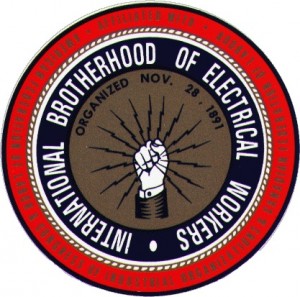IBEW Local 1 approves new contract
 St. Louis – IBEW Local 1 approved a new three-year contract with its contractors represented by the St. Louis Chapter of the National Electrical Contractors Association (NECA).
St. Louis – IBEW Local 1 approved a new three-year contract with its contractors represented by the St. Louis Chapter of the National Electrical Contractors Association (NECA).
Frank D. Jacobs, business manager of IBEW Local One, said the contract strengthens the position of union electricians and their contractors in an increasingly competitive market among commercial and industrial customers.
“We want to remain the clear choice for electrical and communications work among our customers. We have gained market share in the commercial and industrial sectors even during this five-year recession due to the changes we made three years ago.
“We are positioned better than ever to attract greater opportunities for our members by combining price competitiveness with a work force that is the most skilled, safe and productive available.”
Terms provide a first year wage and benefits package increase of $1.55 per hour to journeyman electricians. Due to an 8.77 percent cut in total compensation effective in 2010, total compensation remains nearly three-quarters of a percent below the 2009 rates paid to union electricians. Total package increases of $1.56 in mid-2014 and $1.66 an hour in mid-2015 will incrementally take the electricians’ package to a rate 5 percent above the 2009 rates, equating to an average raise of less than one percent a year over the six-year span.
The contract also covers residential electricians, providing a first year package increase of 96 cents per hour, a rate that is 1.93 percent below 2009 rates. Subsequent increases of $1.30 an hour in 2014 and $1.49 in 2015 provide a total package that is just 3.57 percent above rates paid in 2009, for an average annual raise of less than six-tenths of one percent for the last six years.
The contract affects the 2,900 construction members of IBEW Local 1 and more than 115 union electrical contractors working in the City of St. Louis and 26 counties in Eastern Missouri.
“The new contract terms give our contractors an unprecedented ability to compete on more flexible terms to meet the needs of the construction buyers and general contractors they serve,” said Douglas R. Martin, executive vice president of the St. Louis Chapter, NECA.
FLEXIBILITY OUTSIDE NORMAL HOURS
Demand for electrical and communication construction and maintenance work performed outside normal business hours has risen as many types of facility owners seek to keep their businesses operating without disruption, according to Martin. The new contract allows start times as early as 6 a.m., allows work weeks at regular wage rates with four 10-hour work days, and sets the wage rate on second- and third-shift schedules at a level below standard overtime.
“Universities, retailers, manufacturers, distributors and others value the benefit of having our electricians work in the spans of time when they are not operating at full tilt,” said.
Customers who might have paid time-and-a-half or double time in the past for after-hours or overnight work will be able to take advantage of the very reasonable premium rate our contractors can now offer. As an industry, we want to be there when the customer needs us.”
The new contract adopts a new program for union electricians to participate in joint classes with contractors’ project management staff to improve planning, expedite communication and eliminate project problems. “This joint approach will equip our total team to be focused on what our customers need and want, and deliver together on our promises,” Martin said.
NEW APPRENTICE RULES
The new agreement allows contractors to use entry-level apprentices to match placements with available job opportunities. This allows contractors to deliver more competitive crew costs while sustaining the industry’s skilled work force to meet future needs for qualified electricians. Recruitment and placement of minority and female workers improved when the new procedure was piloted in 2012.
IBEW Local 1 and local electrical contractors have been working in other regions of the country where data centers, power plants, manufacturing facilities and hospitals are under way. “Many regions have not kept pace with the long-term process of developing skilled electricians and communication workers. As a result, they now find they cannot meet the demand for quality workers,” Jacobs said. “Our strong, effective training tradition since 1941 has enabled us to meet peak demand upswings as needed for customers throughout Eastern Missouri while supplying skilled craft workers to other regions nationally when construction demand here wanes.”


Leave a Reply